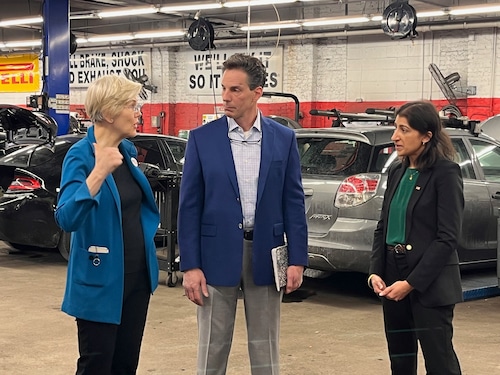U.S. Sen. Elizabeth Warren, D-Mass. (L) speaks with Bob Lane, the president and CEO of Direct Tires & Auto Service, in Watertown, Mass., and U.S. Federal Trade Commission Chairperson Lina Khan on Thursday, Feb. 22, 2024. Warren visited the auto repair shop to stress the importance of Massachusetts’ Right-to-Repair Law (MassLive photo by John L. Micek).John L. Micek
It might be perfectly legal for adult Bay State residents to purchase recreational cannabis from their favorite local purveyor, but weed is still on the federal government’s priority list of controlled substances, creating legal and jurisdictional headaches.
That’s led a coalition of Democratic lawmakers from nearly two-dozen states, led by U.S. Sen. Elizabeth Warren, of Massachusetts, to call on the U.S. Drug Enforcement Administration to drop cannabis from Schedule I of the federal Controlled Substances Act, which includes the most dangerous drugs, such as heroin, and drop it to Schedule III, which includes such substances as ketamine and anabolic steroids.
“The longer marijuana remains scheduled in the [Controlled Substances Act], the longer our communities face senselessly severe penalties and the longer the marijuana laws of the majority of U.S. states remain in conflict with federal law,” the lawmakers wrote in a Thursday letter to U.S. Attorney General Merrick Garland and DEA Administrator Anne Milgram.
U.S. Sens. John Fetterman, D-Pa., and Democratic U.S. Reps. Earl Blumenauer, of Oregon, and Barbara Lee, of California, also led the letter. As Pennsylvania’s lieutenant governor, Fetterman was a leading voice for cannabis legalization in the Keystone State.
The lawmakers’ call comes eight months after the U.S. Department of Heath and Human Services recommended changing marijuana’s designation under federal law, and 18 months after President Joe Biden gave the green-light to HHS and the Justice Department to begin reviewing how the government treats the drug.
“It is time for the Drug Enforcement Agency to act,” the lawmakers wrote.
Warren and her colleagues agued that even though cannabis is “is associated with fewer adverse outcomes than alcohol,” it still remains on the government’s most restricted list of controlled substances.
That, in turn, leads to “severe penalties for marijuana users and businesses, including for criminal records, immigration statuses, employment, taxation, health care, public housing, social services, and more,” they argued.
Cannabis in Massachusetts
Mass. cannabis sales top $1B for third year in a row
Southwick to begin accepting applications for cannabis retailers, due June 7
First dispensary in Boston’s South End serves as wellness center for canna-curious
The call comes as more states and jurisdictions, along with the federal government, have moved to decriminalize possession of marijuana, in states where the drug remains illegal. In all, 24 states, two territories and the District of Columbia have legalized small amounts of cannabis (marijuana) for adult recreational use, according to the National Conference of State Legislatures
At the federal level, the number of people sentenced for simple possession of marijuana plummeted from 2,172 in 2014 to just 145 in 2021, according to U.S. Sentencing Commission data.
“Right now, the [a]dministration has the opportunity to resolve more than 50 years of failed, racially discriminatory marijuana policy,” the lawmakers wrote.
Warren and her colleagues were joined on the letter by U.S. Senate Majority Leader Charles E. Schumer and Sen. Kirsten Gillibrand, both New York Democrats, as well as Democratic Sens. Alex Padilla, of California; John Hickenlooper, of Colorado; Chris Van Hollen, of Maryland; Cory Booker, of New Jersey; Ron Wyden and Jeff Merkley, of Oregon; Peter Welch, of Vermont, and U.S. Sen. Bernie Sanders, I-Vt.
Democratic U.S. Reps. Katie Porter, of California and Robert Garcia, of California; Jan Schakowsky, of Illinois; James. P. McGovern, of Massachusetts; Dina Titus, of Nevada; Val Hoyle, of Oregon; Becca Balint, of Vermont, and Del. Eleanor Holmes Norton, of the District of Columbia, also signed the letter.
H/T: www.masslive.com



